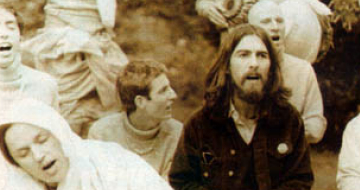George Harrison: Quiet Beatle, Vocal Guru
By Philip Goldberg | Oct 07, 2011

In the 200 years that Eastern spiritual traditions have been filtering into American life, the propagators have included great artists as well as gurus, scholars and scientists. We have absorbed the principles of Hinduism, Buddhism and other Asian religions through the poems of T.S. Eliot and W.B. Yeats; the novels of Herman Hesse, Somerset Maugham and J.D. Salinger; the films of Satyajit Ray and Merchant-Ivory (not to mention “Gandhi”); the music of John Coltrane and Philip Glass; and through various forms of dance, painting and sculpture. But no artist has ever done more for this cross-cultural pollination than George Harrison. With Martin Scorsese’s documentary about the quiet Beatle running on HBO now, it is time to appreciate Harrison as a teacher and a transmitter.
The most conscientiously spiritual of the Beatles, Harrison learned from a number of well-known gurus, living and dead: Swami Vishnudevananda, whom he met when the Beatles were filming “Help!” in the Bahamas; Paramahansa Yogananda and Swami Vivekananda, whose books he read while studying sitar with Ravi Shankar in India; A.C. Bhaktivedanta Swami, whose Hare Krishna chanting Harrison both practiced and recorded; and most famously, Maharishi Mahesh Yogi, from whom he and the lads learned Transcendental Meditation, triggering a media frenzy that put words like mantra, guru and ashram into the vocabulary.
Once he found value in the teachings, Harrison promoted India’s spiritual message with the same passion he brought to his guitar. When Beatles’ manager Brian Epstein died, George’s funky rendering of reincarnation was heard around the world: “There’s no such thing as death anyway. I mean, it’s death on a physical level, but life goes on everywhere, and you just keep going up really.” When the Fab Four departed for India, George told the press why: “For every human, it is a quest to find the answer as to ‘Why are we here? Who am I? Where did I come from? Where am I going?’ That, to me, became the only important thing in my life. Everything else is secondary.” When he discovered Krishna bhakti, the devotional form of yoga, Harrison funded the London Hare Krishna temple and the printing of one of Bhaktivedanta’s books, for which he penned a foreword. He also produced and performed on an album of chants called “Radha-Krishna Temple” that reached a global audience.
Read more: http://www.huffingtonpost.com/philip-goldberg/george-harrison-quiet-bea_b_997255.html















